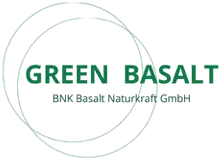Green Basalt – our product
BASALT FLOUR - GREEN BASALT
It is ground rock that originates from liquid magma. It comes from the Earth’s interior – one of the primordial substances of our planet.
Basalt meal holds many beneficial properties, especially for our soils. In its finely ground form – known as rock dust – basalt meal can significantly improve soil structure, making it more fertile and nutrient-rich. It can also be used as a fertilizer.
Product description
- Mineral fertilizers of natural origin;
- Use in regenerative agriculture: Reduces the consumption of production water and increases the amount of carbon dioxide in the soil – carbon sequestration in the soil;
- Environmentally friendly;
- It is not washed out of the soil into the groundwater;
- Gradually decomposes in the soil;
- Over-fertilization is impossible;
- Regulates the mineral balance of the soil;
- Causes a comprehensive remineralization of the substrate;
- Increases plant immunity;
- Increase in the content of plant nutrients (Ca, Mg, K and Na);
- Has a positive effect on the development of the root system;
- Allows you to limit the use of fungicides;
- Facilitates continuous and uniform growth and development of plants and increases yields;
- Stimulates the development of aerobic microorganisms while inhibiting the development of anaerobic bacteria;
- Reduces ammonia emissions;
- Has a deterrent effect on snails, mosquitoes and ants;
- Improves field water capacity;
- Accelerates soil warming and gas exchange with the atmosphere;
- Determines the water absorption of the soil from rainfall;
- Determines the resistance of soils to water erosion;
READ MORE
The Green Basalt product is a mineral fertilizer of natural origin. Research has shown a range of positive effects of the product on the soil in the form of mineral and mineral-organic fertilizers, which can serve as the foundation for regenerative agriculture in line with the Green Deal policy by reducing productive water consumption (in production) and increasing carbon sequestration.
However, the most important advantage of the product is its content of all essential macro-, micro-, and ultra-microelements necessary for the proper growth of plants and for the broader food chain of humans and animals. Basalt meal particles do not leach into groundwater, are non-toxic, and break down gradually in the soil, preventing over-fertilization. This allows large quantities to be applied at once, ensuring fertilization for multiple years.
Basalt meal regulates the mineral balance of the soil, enables comprehensive remineralization of the substrate, increases plant resistance, enhances the content of essential nutrients (Ca, Mg, K, Na), promotes root system development, reduces the need for fungicides, facilitates continuous and even plant growth, and improves yields.
The product stimulates aerobic microorganisms while inhibiting anaerobic bacteria. When applied to manure and slurry, it enriches organic fertilizers with microelements, binds ammonia, and reduces emissions. On soil surfaces, the mineral acts as a natural deterrent against slugs, mosquitoes, and ants.
Basalt meal improves soil water retention, increases available water for plants, and reduces overall water consumption in production. It helps lower the permanent wilting point in plants, enhances growth regulation, and increases soil resistance to water erosion. Additionally, it facilitates oxygen supply to plant roots, accelerates soil warming, improves gas exchange with the atmosphere, and enhances the aggregated (complex) soil structure.
By using basalt meal, the soil’s albedo is reduced, allowing it to warm up faster in the spring and maintain a higher temperature. The chemical properties of the soil improve, calcium availability increases, acidity is reduced, oxidation reactions accelerate, and the bioavailability of macro- and microelements for plants is enhanced.
Plants fertilized with our product contain an increased level of Ormus, a vital element for human health. Consuming products grown with basalt-based fertilizers can supplement or even replace a wide range of dietary supplements (including vitamins, microelements, and ultra-elements such as gold, silver, silicon, and boron).
These elements transition directly into the light state, leading to DNA regeneration, renewal, and modification. This process helps prevent genetic and psychological disorders, synchronizes brain hemispheres, enhances intelligence, strengthens the immune system, boosts vitality, and promotes longevity in human life.
Product description
Green Basalt contains all the minerals essential for plants and humans, including over 40% silicon dioxide, which is lacking in most soils, and over 13% calcium oxide, making soil liming unnecessary. The composition of the product has a positive impact on the physical and chemical properties of the soil, increasing total porosity, air and water capacity, permeability, and root aeration.
Basalt meal gradually releases alkaline cations, significantly increasing Ca, Mg, K, and Na, both in exchangeable and soluble forms, while simultaneously suppressing toxic elements such as Aluminum (Al) and Manganese (Mn). The elements contained in basalt meal are slowly released into the soil.
It contains key components of cell molecules necessary for proper plant growth and development, including Al, Si, S, Ti, Fe, Cu, Zn, Ba, Mn, Se, and Mo, as well as monoatomic elements like gold, silver, platinum, iridium, rhodium, and other elements from the platinum group.
Test Method: PN-EN ISO 12677:2011
SiO2 | 40,9 |
Al2O3 | 12,6 |
Fe2O3 | 13,4 |
CaO | 13,4 |
MgO | 9,50 |
Cr2O3 | <0,10 |
MnO | 0,19 |
K2O | 0,86 |
P2O5 | 0,89 |
SO3 | <0,10 |
Na2O | 2,47 |
TiO2 | 3,14 |
ZrO2 | <0,10 |
